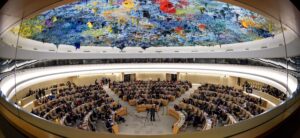In the framework of the 52nd session of the UN Human Rights Council, the Chair-Rapporteur of the Inter-Governmental Working Group in charge of drafting the Binding Treaty on transnational corporations (TNCs) and human rights, the new Ambassador of Ecuador to the UN, Mr. Cristian Espinosa Cañizares, presented the report of the 8th session of the Working Group, which took place in October 2022. To face the Ecuadorian Presidency latest strategies to derail the process, endorsed by their allies, the Global Campaign to reclaim peoples’ sovereignty, dismantle corporate power and end impunity (Global Campaign) intervened in the debate, reiterating the need to re-launch the process in order to fulfil its original mandate.
Part of this diversionary strategy was the unilateral presentation by the Chair, without a mandate from the Intergovernmental Working Group, of new text proposals on the negotiating table before the start of the 8th session in October 2022, undermining the third revised draft treaty, which is the result of the inter-governmental negotiations. Proposals that, as highlighted by Pablo Fajardo of the Union of the Affected by Chevron-Texaco (UDAPT, member of Friends of the Earth International), “weaken the provisions of the future treaty and call into question the agreements made”. The Chair clearly intends to dilute and compromise the content of the future treaty with the inclusion of his new proposals.
The Namibian Permanent Mission to the UN made an intervention along the same lines as the Global Campaign, stating that “the status and objective of the “informal Chair’s proposals” remain unclear despite calls made by the African Group and other countries”. Because of these concerns, these textual proposals should “be withdrawn”, the Namibian delegate suggested, and the revised third draft be “the sole basis for negotiations”.
In his speech, the Chair of the Working group indicated that informal intersessional consultations will be held in the coming months “to try to move the negotiations forward” on the future treaty. It appears that the presidency also intends to exclude social movements and affected communities from the intersessional consultations. This is a new demonstration of the line taken by the Ecuadorian government to advance towards a treaty without including the perspectives of the affected communities, but instead integrating the proposals of the states and entities that defend the interests of TNCs.
In this regard, in his video message, Antonio Salvador, the Asian Task Force representative for the Binding Treaty, stressed that “only with the full and meaningful participation of social movements, trade unions and civil society organisations (CSOs) can the experience of these workers be reflected and addressed in a legally binding instrument. We therefore urge the Presidency to ensure transparency and effective consultation mechanisms with CSOs in the framework of the next inter-sessional period.”
Nonhle Forslund, from Amadiba Crisis Committee South Africa, recalled that the focus of the binding Treaty has to remain on TNCs, and not any type of company. Nonhle emphasised that “in most cases, our courts are unable to prosecute TNCs, if at all”. As we know, from the beginning the strategy of corporate power and its political allies has been to demand that the scope of the Treaty be extended to all types of business. A clear strategy of diversion from the focus of the problem.
In this regard, it is highly concerning the “clarification” on the issue of the scope made in the Guidelines of the inter-sessional consultations published by the Chair the 23rd of March 2023. Indeed, the statement that “States should accept that the instrument will apply to all companies and business activities” is unacceptable, as it flagrantly violates the original mandate established by Resolution 26/9. A further attempt to undermine the democratic character of the process, disregarding the positions expressed by many States, experts, civil society and affected communities’ organisations and movements.
In her statement, Nonhle also reiterated the need to recognise communities’ “Right to Say NO” to corporate projects, as well as the Global Campaign’s firm opposition to any attempts of corporations capturing the process.
Ayushi Kaylab, from FIAN International, highlighted the relevance of putting human rights above private or commercial law by establishing exceptions, where necessary in those regimes, to ensure access to effective justice for affected communities beyond the borders of their countries. She also stressed the importance of the treaty reflecting diverse legal cultures in its clauses and not just the dominant positions of the global north. She also joined the unequivocal message from civil society calling for the full participation of civil society and affected communities in the process, including in inter-sessional consultations.
Finally, Samuel Geith, representative from CETIM, stressed that “social movements, affected communities and States committed to a Binding Treaty call for an effective instrument whose content addresses the challenges posed by TNCs and fills in the existing legal gaps”, calling on UN member states to engage constructively with the negotiations.
It is necessary to return to the original course of this historic process, as defined by Resolution 26/9, defending it from attacks and instrumentalization. The Binding Treaty belongs to those affected, to the social movements, to the popular classes that fight against corporate impunity. The Global Campaign will continue its struggle to achieve these goals, in the perspective of social and climate justice.

